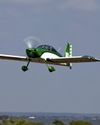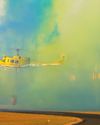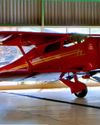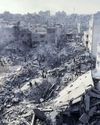
AS THE AIRCRAFT CAME INTO view, hundreds of people who had been waiting to greet the massive antelope at the dry, grassy edge of Angola's Luando Strict Nature Reserve, broke into tears, song, laughter, dancing. For the Angolan people, the giant sable is a national symbol, adorning everything from soccer jerseys to postage stamps. But this giant sable represented something even greater; hope.
As Barney deftly delivered the tranquilised bull to the ground, a group of shepherds and scientists loosened the strops and rolled the sable onto a stretcher. A dozen people, under the watchful eye of another wildlife legend, Dr Pete Morkel, hoisted the stretcher into the belly of a Eurocopter AS365 Dauphin, a second, larger helicopter.
The crowd pushed forward. Some people tried to get one last glimpse, others hoped to hug or shake hands with curly-haired biologist Pedro Vaz Pinto, who stood nearby, looking a little dizzy with disbelief. Somehow, against enormous odds, he had just led a team in tracking, tranquilizing, and transporting the 500-pound bull, which would journey another 60 miles north to Cangandala National Park, where it and nine female giant sables would comprise the world’s first captive breeding program for the nearly extinct animal.
“It was an absolute magical moment”, Pedro Vaz Pinto reminisces with an incredulous smile many years later, having witnessed many magical moments over the course of his 20-year mission to save the charismatic ungulate. However the animals future remains terrifyingly fraught. It remains beyond comprehension that this icon, the national animal of Angola, remains completely ignored by the government and its survival is dependent on a small handful of private individuals.
هذه القصة مأخوذة من طبعة SA Flyer Magazine 2023 من SA Flyer Magazine.
ابدأ النسخة التجريبية المجانية من Magzter GOLD لمدة 7 أيام للوصول إلى آلاف القصص المتميزة المنسقة وأكثر من 9,000 مجلة وصحيفة.
بالفعل مشترك ? تسجيل الدخول
هذه القصة مأخوذة من طبعة SA Flyer Magazine 2023 من SA Flyer Magazine.
ابدأ النسخة التجريبية المجانية من Magzter GOLD لمدة 7 أيام للوصول إلى آلاف القصص المتميزة المنسقة وأكثر من 9,000 مجلة وصحيفة.
بالفعل مشترك? تسجيل الدخول

Iris - her early years: IRIS FLIES ACROSS SUDAN
Laura McDermid continues her stories about Iris McCallum's early years in East Africa and the Sudan. In part 1 of this story she recounts how she had to fly a bunch of Belgian Missionaries to Aweil, a city in northwestern South Sudan, from Wilson in Nairobi in her old mate 'ARN', the Piper Aztec 5Y-ARN.

UGLY IS PRETTY: LEAR 25 VS PILATUS PC-6
When you go to a party where you don't know anybody, you should always go for the 'Ugly' girl, because she will be happy that you chose to spend time with her.

CIRRUS G7 LAUNCHED IN AFRICA
What makes one aircraft better than another? Range, Speed, or carrying capacity, short field performance, operating costs, high wing, low wing, side stick, traditional control yoke?

PRESIDENT'S TROPHY AIR RACE 2024
The annual Presidents Trophy Air Race (PTAR) is the highlight of the year for many competitive general aviation pilots.

THE ABSA LOWVELD AIRSHOW 2024
This year marked the thirtieth edition of the Lowveld airshow – and it was widely acclaimed as the best ever.

PREVIEW: AFRICAN AEROSPACE AND DEFENCE EXPO(AAD)
Guy Leitch finds out from AAD Exhibition Director, Ms Nakedi Phasha, how the buildup to this year's biennial expo is going, and what visitors and exhibitors can expect.

APRIL 2023
April has been a very quiet month on the local aviation marketplace with only nine new registration allocations and three deletions, according to the officially-supplied register review.

PIPISTREL PANTHERA FINALLY HERE
One of the world's most eagerly awaited piston single engine aircraft designs has finally arrived in South Africa. ZU-KTR is a long awaited Panthera, proudly owned by Bertus Kritzinger, a Free State trucker, and based at New Tempe in Bloemfontein, where the well-known Ferriera Aviation has assembled it.

STAGGERWING - ALREADY OLD WHEN NEW
The Staggerwing was the climax, and the end, of an era.

The Aim of Bombing
In modern warfare it's not the soldiers who die - it's the civilians. One of the best examples of this is carpet bombing.